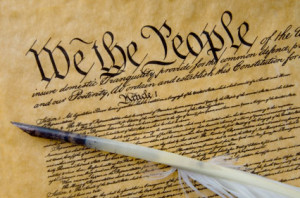 Yesterday I blogged about the Supreme Court’s decision in Fisher vs. The University of Texas and how legislation with a discriminatory impact that does not have a discriminatory intent does not violate the equal protection clause of the Fourteenth Amendment. Today’s Supreme Court decision in Shelby vs. Holder deserves a similar analysis, with what I consider a different result. The Court ruled incorrectly in both cases, I think, because of the potential discriminatory impacts. What’s the difference? Voting is a fundamental right. A Public education is not a fundamental right.
Yesterday I blogged about the Supreme Court’s decision in Fisher vs. The University of Texas and how legislation with a discriminatory impact that does not have a discriminatory intent does not violate the equal protection clause of the Fourteenth Amendment. Today’s Supreme Court decision in Shelby vs. Holder deserves a similar analysis, with what I consider a different result. The Court ruled incorrectly in both cases, I think, because of the potential discriminatory impacts. What’s the difference? Voting is a fundamental right. A Public education is not a fundamental right.
At first I lauded the results of the Supreme Court. Section Five of the Voter Rights Act grants the Department of Justice the right to evaluate the redistricting of suspect States in a preclearance procedure. This was passed in 1965 to curb voter suppression which, to quote from the opinion today, is
“an insidious and pervasive evil which had been perpetuated in certain parts of our country through unremitting and ingenious defiance of the Constitution.”
Why did I like the idea that we were taking away the right of the Department of Justice to make sure redistricting didn’t result in voter suppression of minorities? Because, as a proud man from the South (born in Cleveland, but don’t tell anyone) I like to think that the time when the people around me would engage in racist and derogatory discrimination in voting practices were long over, and I don’t like my local elections being delayed because I need the Federal Government to say we know how to elect our officials. “We’ve grown past this” I thought. Then it dawned on me. This will pave the way for voter ID legislation.
This will open the door to voter ID laws. An invasion of privacy as unconstitutional as non-judicial NSA wiretaps… http://t.co/RwRdqhcUDb
— David Dorer (@DavidTDorer) June 25, 2013
Not as quick as I tweeted this morning my thoughts about voter IDs coming down the pike did Texas and North Carolina announce moving forward with their voter ID laws. Laws which, in some States (South Carolina), were intentionally brought to suppress minority votes. These States that were held suspect for their voting manipulation in the 60s are still trying to do it today.
“Sure,” you think to yourself, “Alan Clemmons from South Carolina may have said ‘Amen’ when a supporter of voter ID laws said that ‘if black voters received a reward for obtaining the voter ID ‘it would be like a swarm of bees going after a watermelon.’ but that doesn’t mean all voter ID laws have a discriminatory intent.”
That may be so, but I am willing to give the state a little latitude when you’re talking about a kid not getting to go to her first choice public college. That’s not a fundamental right. That’s not an essential operation of our representative democracy. Voting is. As such, it should be subject to strict scrutiny. If the DOJ isn’t going to make sure that these acts by States to suppress the vote are quashed, the Supreme Court better remember it’s own words about Strict Scrutiny from yesterday’s decision.
Strict scrutiny must not be “ ‘strict in theory, but fatal in fact,’” But the opposite is also true. Strict scrutiny must not be strict in theory but feeble in fact.
If you’re going to take away the Executive’s authority to make sure States uphold the Fourteenth Amendment, Supreme Court, you better be ready to strike down unjust laws that block minorities from the voting booth.
Tune in tomorrow for Talking Law with David Dorer.